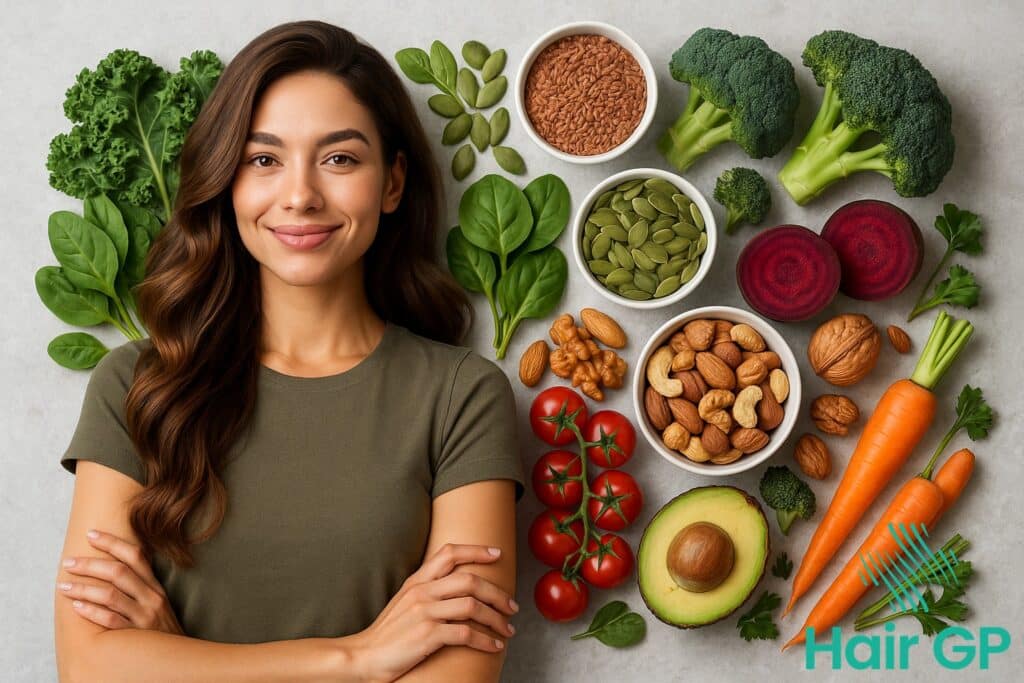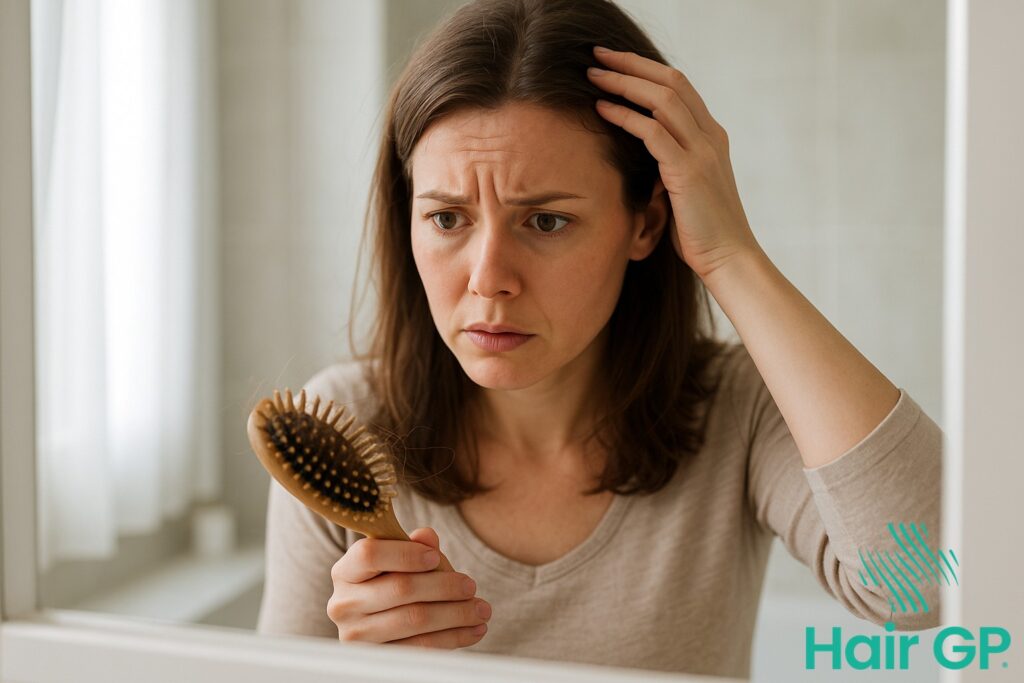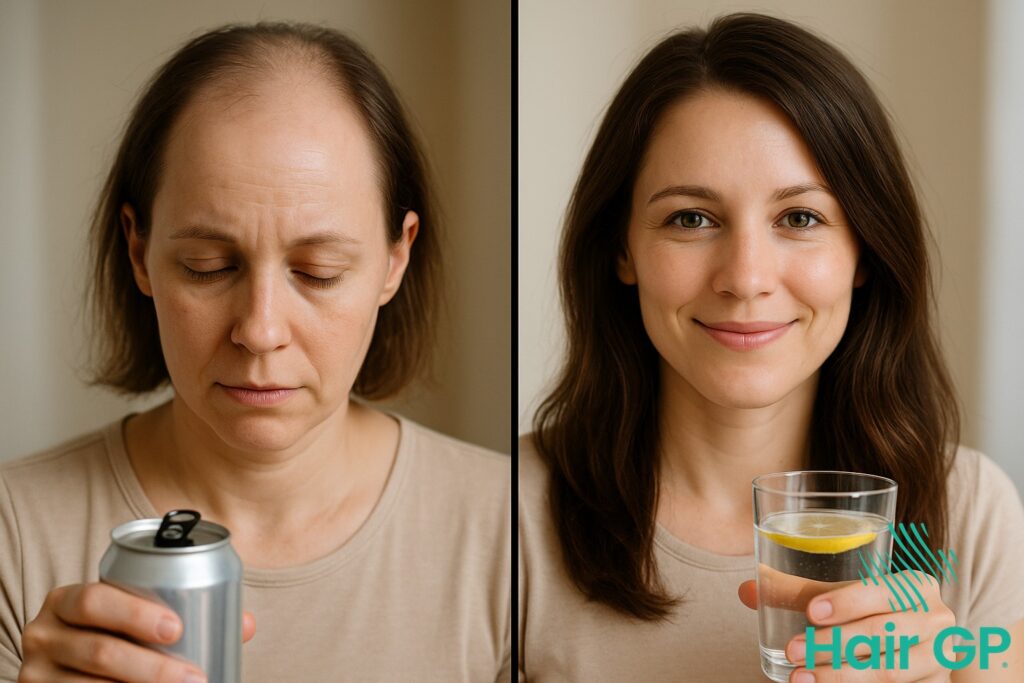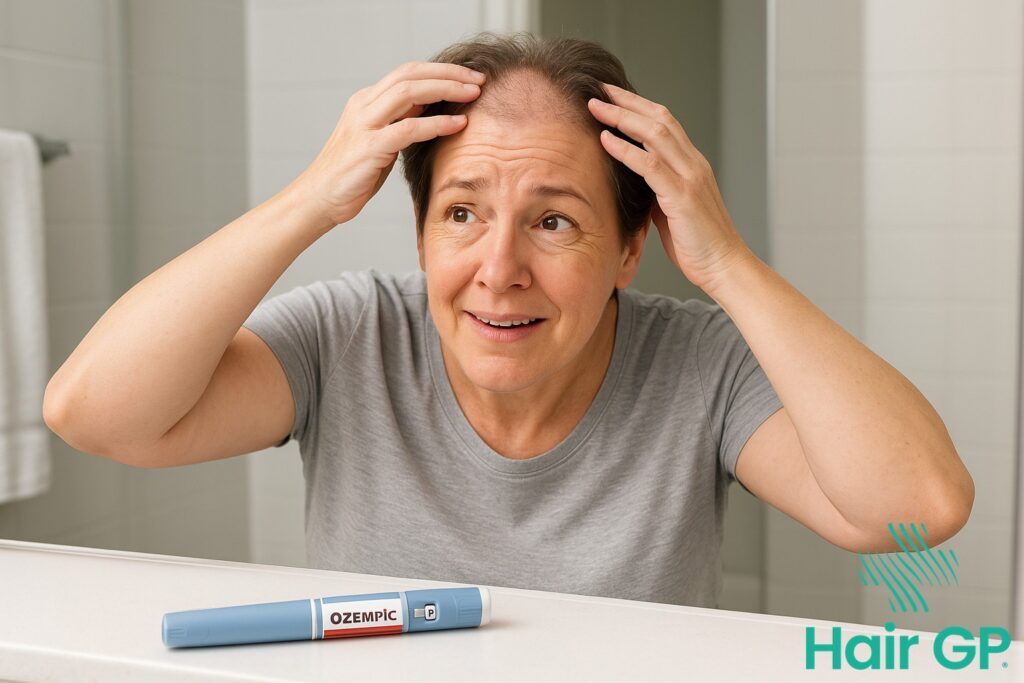Introduction
More women than ever are embracing plant-based lifestyles for their health, environmental, and ethical benefits. However, many plant-based women experience an unexpected challenge: hair loss. Whilst a well-planned vegan or vegetarian diet can provide exceptional nutrition, certain essential nutrients critical for hair health may be more challenging to obtain from plant sources alone, potentially leading to deficiencies that manifest as thinning hair or increased shedding.
Hair loss in women, including female pattern hair loss and other forms of thinning, can be particularly distressing. The connection between nutrition and hair health is profound—your hair follicles are among the most metabolically active cells in your body, requiring a steady supply of specific vitamins, minerals, and macronutrients to maintain their growth cycles and structural integrity.
This comprehensive guide addresses the unique nutritional considerations for plant-based women concerned about hair health. We’ll explore how specific nutrient deficiencies common in plant-based diets can contribute to hair thinning and loss, and more importantly, how to prevent and address these issues through strategic nutrition and evidence-based approaches.
You’ll discover the critical role of nutrients like iron, protein, B vitamins, zinc, and essential fatty acids in maintaining healthy hair growth. We’ll examine the science behind nutrient absorption from plant sources, identify powerful plant-based superfoods for hair health, and provide practical strategies for meal planning and targeted supplementation. Additionally, you’ll learn to monitor your progress and adjust your nutritional approach for optimal results whilst maintaining your cherished plant-based principles.
This article is for informational purposes only and does not constitute medical advice. Supplement needs can vary greatly between individuals, and dosing should always be guided by a qualified healthcare professional. Please consult a doctor or registered dietitian before starting any new supplements, especially when following a plant-based diet.
Key Takeaways – TL/DR
- Plant-based diets can support healthy hair growth when properly planned with adequate nutrients
- Iron, protein, B vitamins, and omega-3 fatty acids are critical nutrients often lacking in vegan diets
- Strategic food choices and targeted supplementation can prevent nutritional deficiencies that cause hair loss
- Female pattern hair loss and telogen effluvium are the most common types affecting plant-based women
Understanding Hair Loss in Plant-Based Women
Understanding the specific mechanisms behind hair loss in plant-based women requires examining how dietary patterns intersect with female-specific hair loss conditions. Whilst plant-based diets offer numerous health benefits, certain nutritional gaps may exacerbate existing predispositions to hair thinning, making it essential to recognise the various forms of alopecia that disproportionately affect women.
Female Pattern Hair Loss and Hormonal Factors
Female pattern hair loss, also known as androgenetic alopecia, affects approximately 40% of women by age 50 [1]. Unlike male pattern baldness, this condition typically presents as diffuse thinning across the crown rather than distinct bald patches. The primary driver is sensitivity to dihydrotestosterone (DHT), a hormone that miniaturises hair follicles over time. Plant-based diets can influence this process through multiple pathways, as certain plant compounds called phytoestrogens may help modulate hormone levels. Soy isoflavones, lignans in flaxseeds, and other plant oestrogens can potentially provide protective effects against DHT sensitivity. However, the relationship is complex—whilst some plant compounds may offer hormonal balance, nutritional deficiencies common in poorly planned plant-based diets can simultaneously accelerate hair loss. Iron deficiency, prevalent among plant-based women due to lower bioavailability of non-haeme iron, can worsen androgenetic alopecia by compromising the hair growth cycle. Additionally, insufficient protein intake may reduce keratin production, weakening hair structure and accelerating the miniaturisation process that characterises female pattern hair loss.
Telogen Effluvium and Nutritional Triggers
Telogen effluvium represents the most common form of hair loss in women transitioning to plant-based diets. This condition occurs when hair follicles prematurely enter the resting phase, leading to diffuse shedding 2-4 months after a triggering event. Nutritional deficiencies affect up to 86% of individuals following restrictive diets [2], making plant-based women particularly susceptible to this stress-induced hair loss. Common triggers include sudden dietary changes, rapid weight loss, or developing deficiencies in iron, zinc, B vitamins, or protein. The body interprets these nutritional stresses as threats, redirecting resources away from non-essential functions like hair growth. Recovery typically takes 6-12 months once nutritional balance is restored, though some women may experience prolonged shedding if underlying deficiencies persist. Unlike androgenetic alopecia, telogen effluvium is generally reversible with proper nutritional intervention. However, chronic nutritional inadequacy can transform temporary telogen effluvium into a persistent condition, potentially triggering or accelerating female pattern hair loss in genetically predisposed individuals. Understanding this distinction helps plant-based women identify whether their hair loss stems from temporary nutritional stress or requires long-term management strategies.
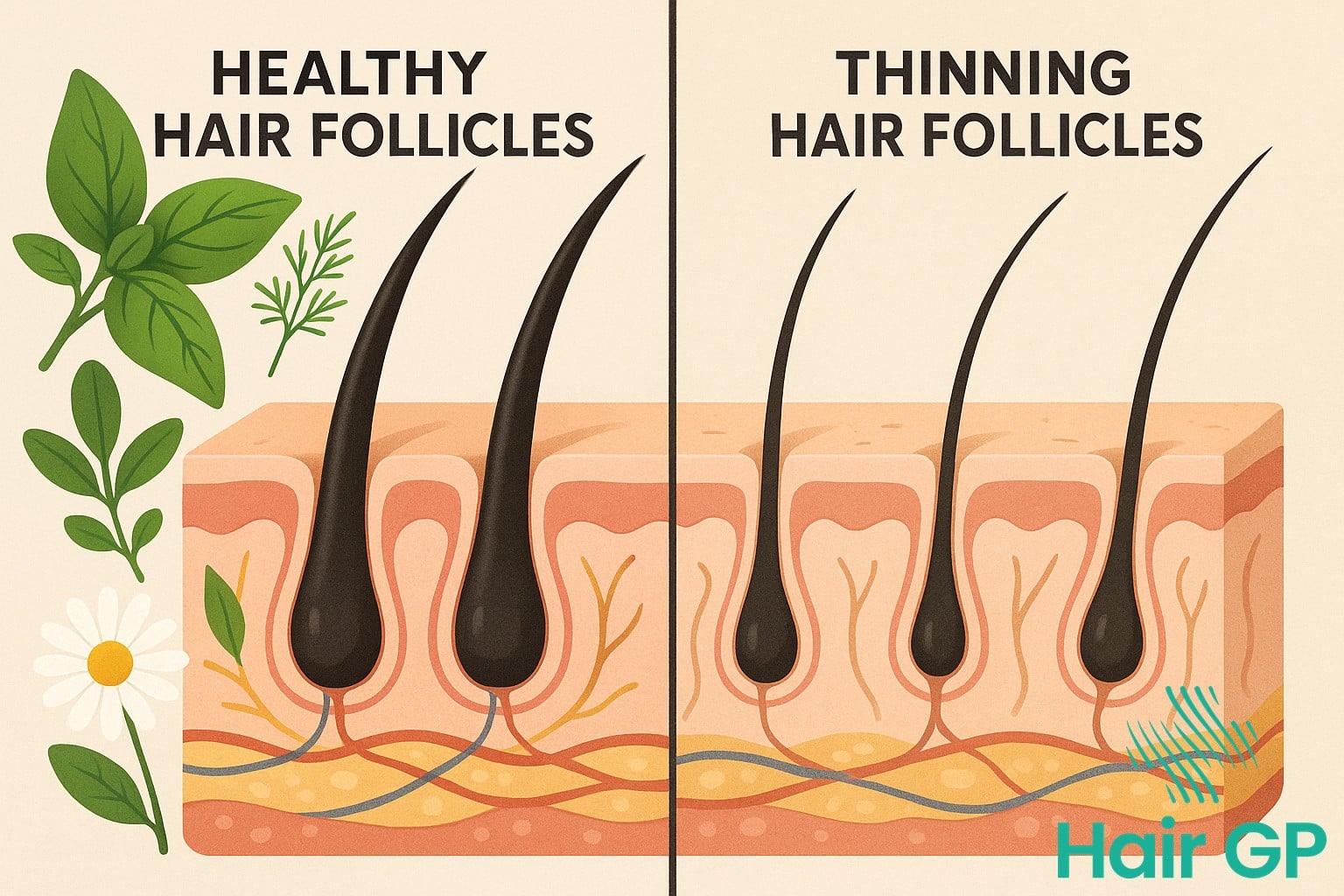
Essential Nutrients for Healthy Hair Growth
Understanding the essential nutrients required for optimal hair health forms the foundation of maintaining strong, vibrant hair throughout your life. Hair follicles are amongst the most metabolically active structures in the human body, requiring a continuous supply of key nutrients to support the complex processes of hair growth, maintenance, and renewal [3].
Protein serves as the fundamental building block for hair health, as hair strands consist primarily of keratin, a fibrous protein. Adequate protein intake ensures your body can synthesise the structural components necessary for strong, resilient hair. Iron represents another critical nutrient, as iron deficiency is strongly associated with hair thinning and increased hair shedding, particularly in women [2]. This mineral supports oxygen transport to hair follicles and plays a vital role in cellular energy production within these rapidly dividing cells.
The B-vitamin complex, particularly biotin (B7), B12, and folate, contributes significantly to hair growth by supporting cellular metabolism and DNA synthesis within hair follicles. Biotin specifically aids in keratin production, whilst B12 and folate are essential for proper cell division during the hair growth cycle. Zinc deficiency can lead to hair loss and changes in hair texture, as this mineral regulates hormone levels and supports protein synthesis crucial for healthy hair development.
Vitamin D plays an increasingly recognised role in hair health, with research indicating its importance in hair follicle cycling and the maintenance of the hair growth phase. Low vitamin D levels have been linked to various forms of hair loss, highlighting its significance as one of the key nutrients for sustained hair growth.
Vitamin C enhances iron absorption whilst supporting collagen production, which strengthens the hair shaft and surrounding structures. Essential fatty acids, particularly omega-3 and omega-6 fatty acids, contribute to scalp health and hair shine by maintaining the integrity of cell membranes and reducing inflammation that can impede hair growth.
These essential nutrients work synergistically to maintain the complex biological processes underlying healthy hair growth. A deficiency in any of these key nutrients can disrupt the hair growth cycle, leading to thinning, breakage, or changes in hair texture and appearance.
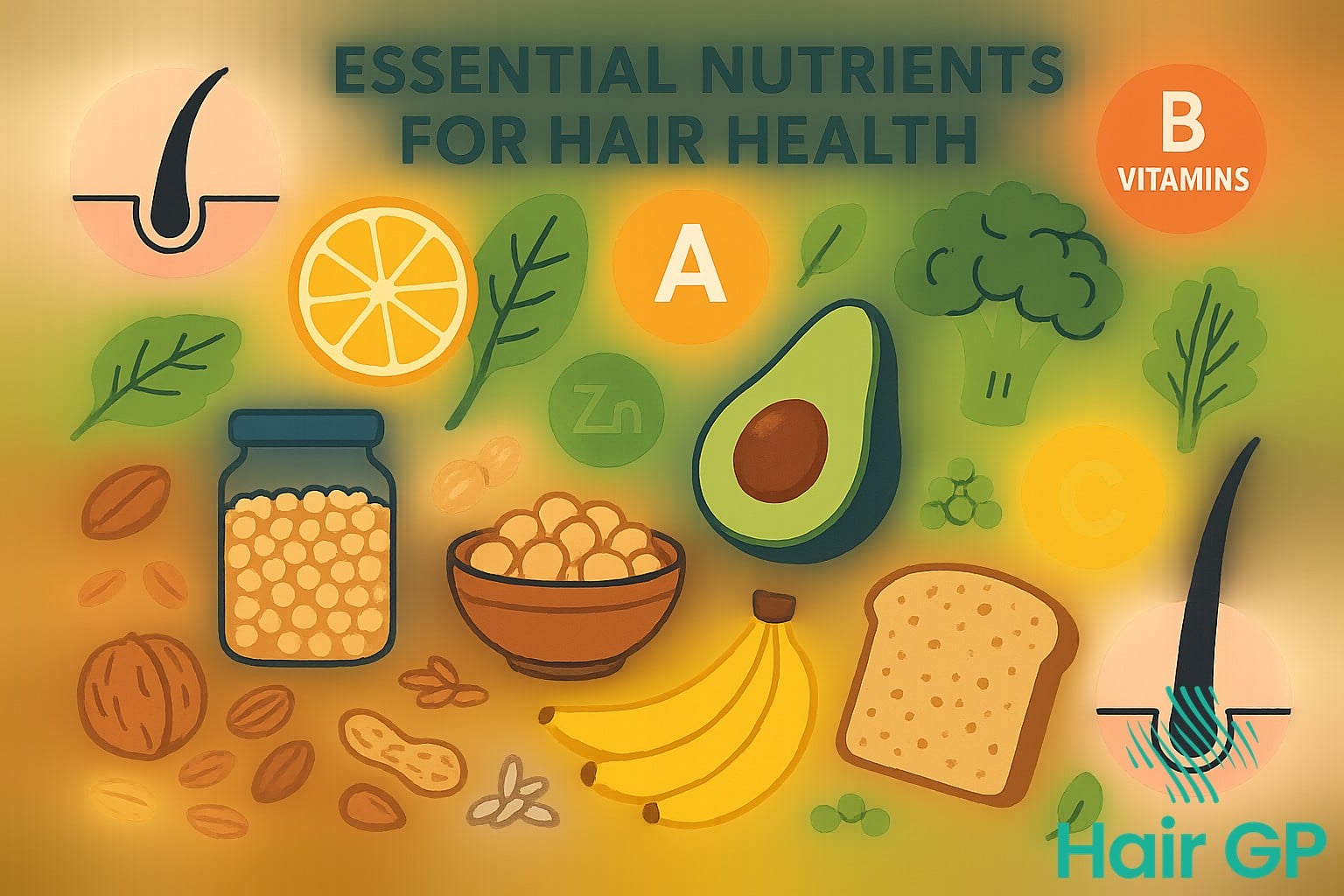
Iron Deficiency and Hair Loss Connection
Iron deficiency represents one of the most significant nutritional challenges affecting hair health in women following plant-based diets. Research demonstrates that vegetarians and vegans experience higher rates of iron deficiency compared to omnivores, with studies indicating prevalence rates of 12-47% among plant-based populations [4]. This mineral deficiency directly impacts hair follicle function, as iron plays a crucial role in cellular energy production and oxygen transport essential for healthy hair growth cycles.
Non-Heme Iron Absorption Strategies
Maximising iron absorption from plant based foods requires strategic nutritional planning, as non-haem iron from plant sources exhibits significantly lower bioavailability than haem iron. Vitamin C stands as the most potent enhancer of non-haem iron absorption, with studies showing that consuming 25-100mg of ascorbic acid alongside iron-rich meals can increase absorption rates by up to 300% [5]. Incorporating citrus fruits, bell peppers, strawberries, or tomatoes with iron-rich plant based foods creates optimal absorption conditions.
Several compounds commonly found in plant-based diets can inhibit iron absorption and potentially contribute to mineral deficiencies. Phytates in whole grains and legumes, polyphenols in tea and coffee, and calcium from dairy alternatives can significantly reduce iron bioavailability when consumed simultaneously. Strategic meal timing becomes crucial—consuming iron-rich foods separately from calcium supplements and avoiding tea or coffee within two hours of iron-rich meals can dramatically improve absorption rates.
Cooking techniques also influence iron availability from plant sources. Using cast-iron cookware can increase the iron content of foods, whilst soaking and sprouting legumes and grains reduces phytate content, enhancing mineral absorption. Fermentation processes, such as those used in tempeh production, similarly improve iron bioavailability.
Best Plant-Based Iron Sources for Hair Health
Legumes and beans provide exceptional iron density for supporting hair health, with lentils containing approximately 6.6mg per cooked cup and chickpeas providing 4.7mg. These protein-rich foods also supply essential amino acids required for keratin synthesis, making them particularly valuable for addressing both iron deficiency and hair loss simultaneously.
Dark leafy greens offer readily absorbed iron alongside folate and other nutrients supporting hair follicle health. Spinach provides 6.4mg per cooked cup, whilst Swiss chard and kale offer substantial amounts. The vitamin C content in these vegetables enhances their own iron absorption, creating naturally optimised nutrition packages.
Fortified foods represent reliable iron sources for plant-based individuals, with fortified cereals and plant milks providing significant amounts of bioavailable iron. Many fortified products contain iron bisglycinate, a chelated form with superior absorption compared to other iron compounds. Quinoa, hemp seeds, and pumpkin seeds provide additional iron whilst supporting overall nutritional density essential for preventing hair loss related to mineral deficiencies.
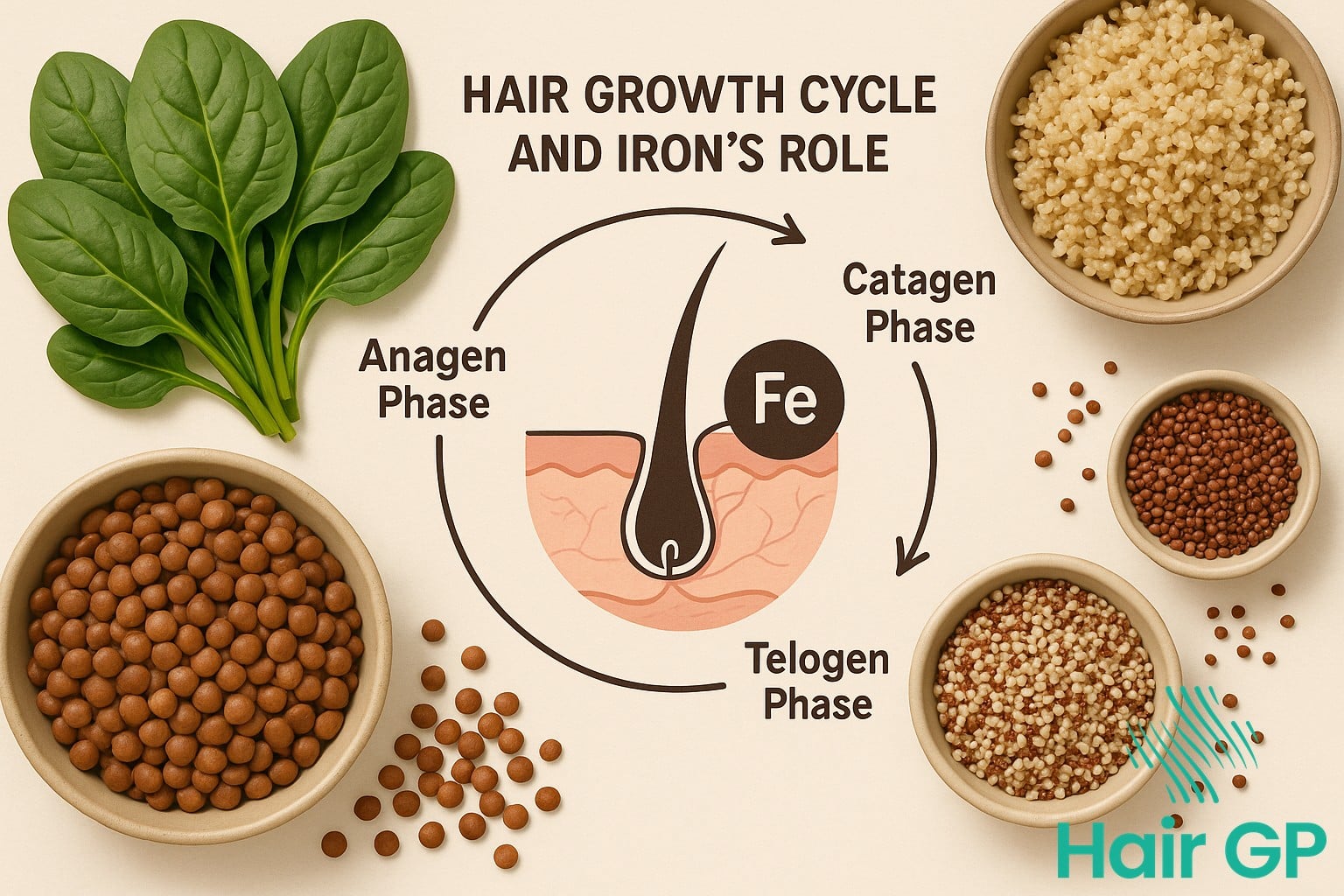
Protein and Amino Acids for Strong Hair
Hair is fundamentally composed of protein, making adequate protein intake essential for maintaining strong, healthy hair growth. Plant based foods can effectively meet all protein requirements for optimal hair health when properly combined to provide complete amino acid profiles.
Essential Amino Acids for Hair Structure
Hair’s primary structural component, keratin, requires specific amino acids for proper formation and strength. Research demonstrates that protein deficiency can lead to hair thinning, breakage, and changes in hair texture [2]. Cysteine and methionine are particularly crucial amino acids for hair health, as they contain sulphur bonds that create the strong cross-links within keratin fibres. These sulphur-rich amino acids contribute to hair’s elasticity and resilience against mechanical damage.
Lysine plays an equally important role in hair growth by facilitating protein synthesis and supporting the absorption of iron and zinc, minerals essential for healthy hair development. This amino acid helps strengthen hair follicles and may reduce hair shedding when consumed in adequate amounts. Plant based foods rich in lysine include legumes, quinoa, and buckwheat, making it readily accessible through thoughtful dietary planning.
Complete protein profiles containing all nine essential amino acids are necessary for optimal hair growth and maintenance. While individual plant proteins may lack certain amino acids, strategic combinations can provide complete nutritional profiles that rival any protein source for supporting hair health.
Plant-Based Complete Protein Combinations
Rice and beans represent one of the most accessible complete protein combinations, with rice providing methionine whilst beans supply lysine. This classic pairing creates a comprehensive amino acid profile that supports keratin production and hair follicle health. Consuming these foods within the same day ensures optimal protein utilisation for hair growth.
Quinoa stands out as a naturally complete protein source, containing all essential amino acids in balanced proportions. This ancient grain provides approximately 8 grams of protein per cooked cup, making it an excellent foundation for hair-healthy meals. Its versatility allows for easy incorporation into breakfast bowls, salads, and main dishes.
Hemp and chia seeds offer concentrated complete protein sources that can be easily added to smoothies, yoghurt alternatives, or baked goods. Hemp seeds provide all essential amino acids along with beneficial omega fatty acids that support scalp health. Chia seeds contribute protein whilst offering additional fibre and minerals that complement overall hair nutrition.
Combining nuts and seeds with whole grains throughout the day ensures comprehensive amino acid coverage. Almonds paired with oats, or tahini with wholemeal bread, create synergistic protein combinations that support sustained hair growth and strength. These combinations demonstrate that plant based foods can effectively meet all protein requirements for maintaining healthy, strong hair when consumed as part of a varied, well-planned diet.
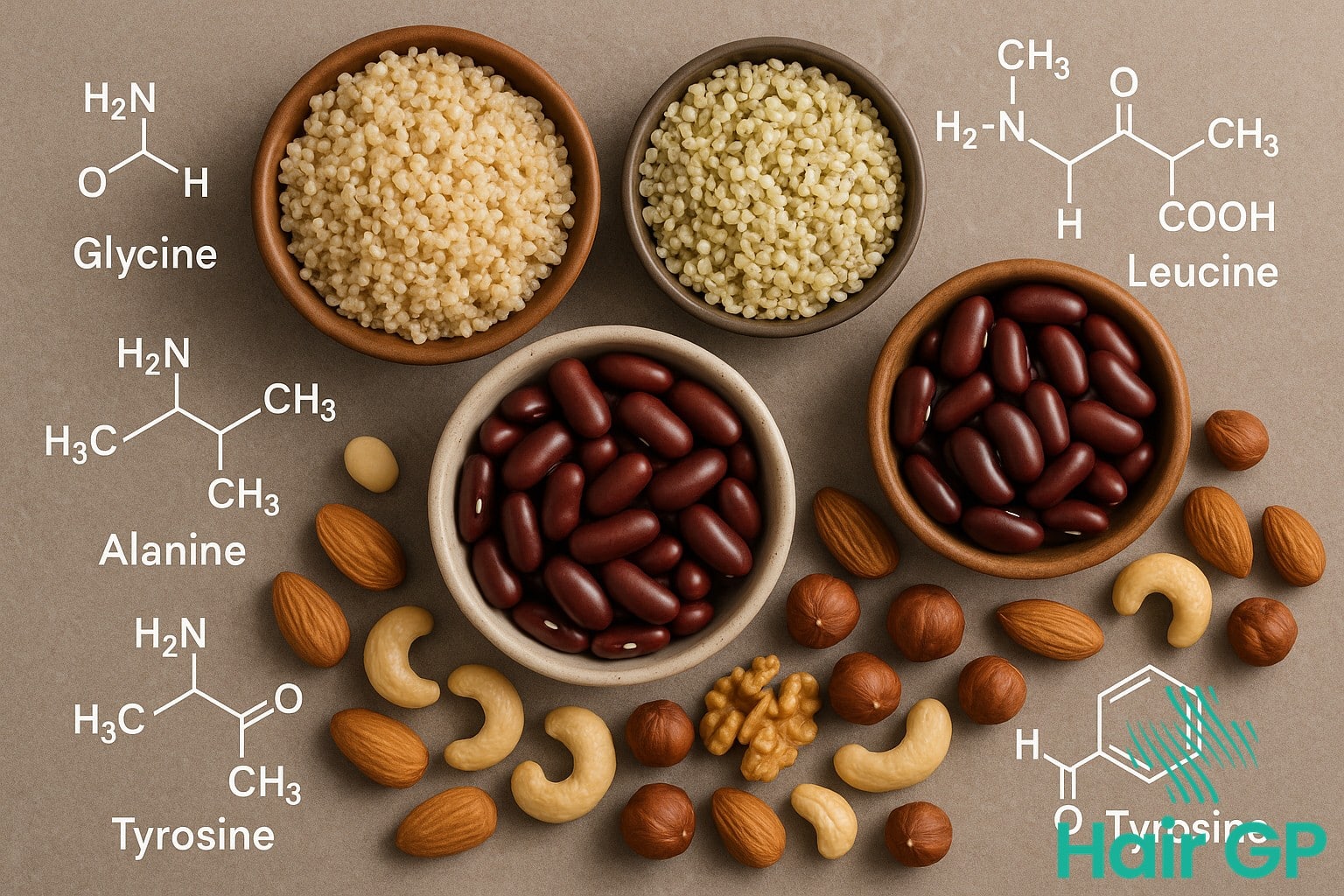
B Vitamins Critical for Hair Health
B vitamins represent key vitamins essential for maintaining healthy hair growth and preventing vitamin deficiency on plant-based diets. Particular attention must be paid to vitamin B12, biotin, and folic acid, as deficiencies in these nutrients can significantly impact hair health and quality in women following vegan lifestyles.
Vitamin B12 and Hair Loss Prevention
Vitamin B12 deficiency poses the most significant risk for plant-based women, with studies indicating that up to 86% of vegans may experience B12 insufficiency [6]. This deficiency directly correlates with hair loss, as B12 plays a crucial role in DNA synthesis and red blood cell formation, both essential for healthy hair follicle function. Hair loss associated with B12 deficiency typically manifests as diffuse thinning, premature greying, and reduced hair growth rate [2].
Supplementation strategies must be implemented proactively, with recommended daily doses ranging from 250-1000 micrograms of cyanocobalamin or methylcobalamin for maintenance. Higher therapeutic doses may be necessary for individuals with established deficiency. Regular testing through serum B12 or methylmalonic acid levels should occur annually, with optimal B12 levels maintained above 400 pg/mL for hair health preservation.
Plant-based women should begin B12 supplementation immediately upon adopting vegan diets, as liver stores typically last only 2-4 years. Sublingual tablets, fortified nutritional yeast, and B-complex supplements provide reliable sources, though whole food sources remain insufficient for meeting daily requirements.
Biotin, Folate, and Other B Vitamins
Biotin deficiency, though rare, can cause significant hair loss and brittle hair texture in plant-based dieters. Daily biotin requirements of 30 micrograms are typically met through whole grains, nuts, and seeds, though supplementation with 5000-10000 micrograms may benefit women experiencing hair thinning or slow growth rates.
Folic acid availability proves abundant in plant-based diets through dark leafy greens, legumes, and fortified grains. Spinach, asparagus, and lentils provide exceptional folate density, supporting DNA synthesis crucial for rapid hair cell division. Daily folate requirements of 400 micrograms are easily achieved through varied plant consumption, though synthetic folic acid supplementation may enhance absorption rates.
Vitamin B6 contributes significantly to hair growth through its role in protein metabolism and cysteine synthesis, a key amino acid in hair structure. Chickpeas, potatoes, and bananas provide excellent B6 sources, with daily requirements of 1.3-1.7 milligrams readily obtainable through diverse plant foods.
Additional B vitamins including riboflavin, niacin, and pantothenic acid support hair health through energy metabolism and cellular repair processes. These nutrients appear abundantly in whole grains, legumes, and vegetables, making deficiency unlikely with varied plant-based eating patterns. However, monitoring overall B-complex status through comprehensive testing ensures optimal hair health maintenance on plant-based diets.
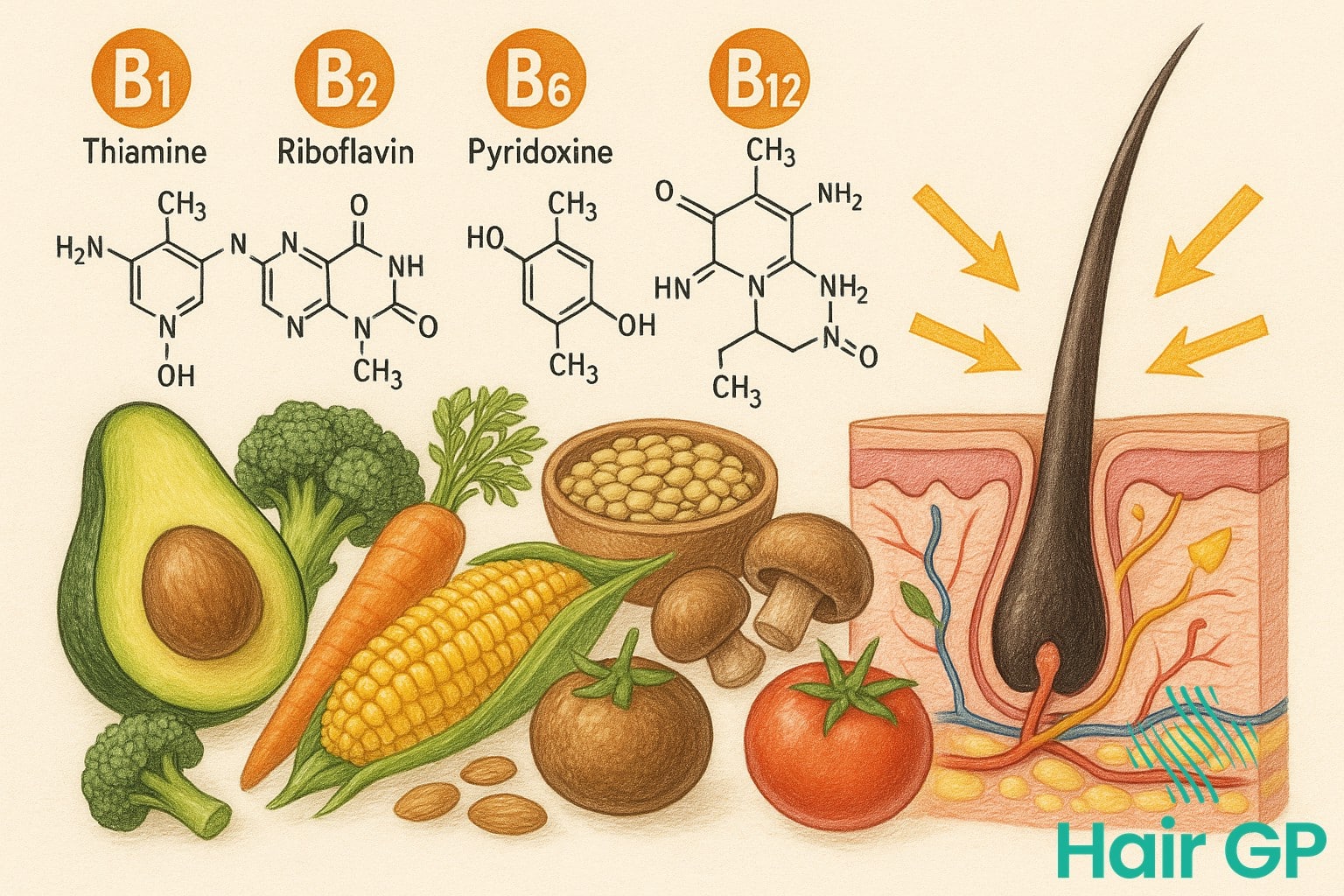
Zinc Deficiency and Hair Thinning
Zinc deficiency represents one of the most common nutritional deficiencies affecting hair health in plant-based women, with this essential mineral playing a crucial role in hair follicle development, protein synthesis, and cellular repair. When zinc levels become inadequate, hair thinning often emerges as an early warning sign, as hair follicles are particularly sensitive to mineral deficiencies due to their rapid cell turnover and high metabolic demands.
Plant-based diets present unique challenges for maintaining optimal zinc status, primarily due to the presence of phytates in whole grains, legumes, and seeds. These naturally occurring compounds bind to zinc during digestion, significantly reducing its bioavailability compared to animal-based sources [7]. Research indicates that zinc absorption from plant foods can be 15-20% lower than from animal products, making it essential for plant-based women to consume higher amounts to meet their physiological needs.
The symptoms of zinc deficiency often manifest gradually, with hair thinning being accompanied by slower wound healing, compromised immune function, and changes in taste or smell. Hair follicles require adequate zinc for proper keratin synthesis, and when levels drop below optimal ranges, hair becomes brittle, grows more slowly, and may begin to shed excessively. This creates a cycle where nutritional deficiencies compound hair loss concerns.
Addressing zinc deficiency through plant-based sources requires strategic meal planning and preparation techniques. Soaking, sprouting, and fermenting zinc-rich foods like pumpkin seeds, sesame seeds, and legumes can reduce phytate content and improve mineral absorption [8]. Hemp seeds, cashews, and quinoa provide readily available zinc whilst supporting overall nutritional balance.
Supplementation may prove necessary for some plant-based women, particularly during periods of increased zinc requirements such as stress, illness, or hormonal changes. Zinc picolinate or zinc bisglycinate forms offer superior absorption compared to zinc oxide or sulphate. However, timing matters significantly – taking zinc supplements away from high-fibre meals and calcium-rich foods maximises absorption. Regular monitoring through blood tests helps ensure adequate levels whilst preventing excessive intake, which can interfere with copper absorption and other mineral deficiencies that also impact hair health.
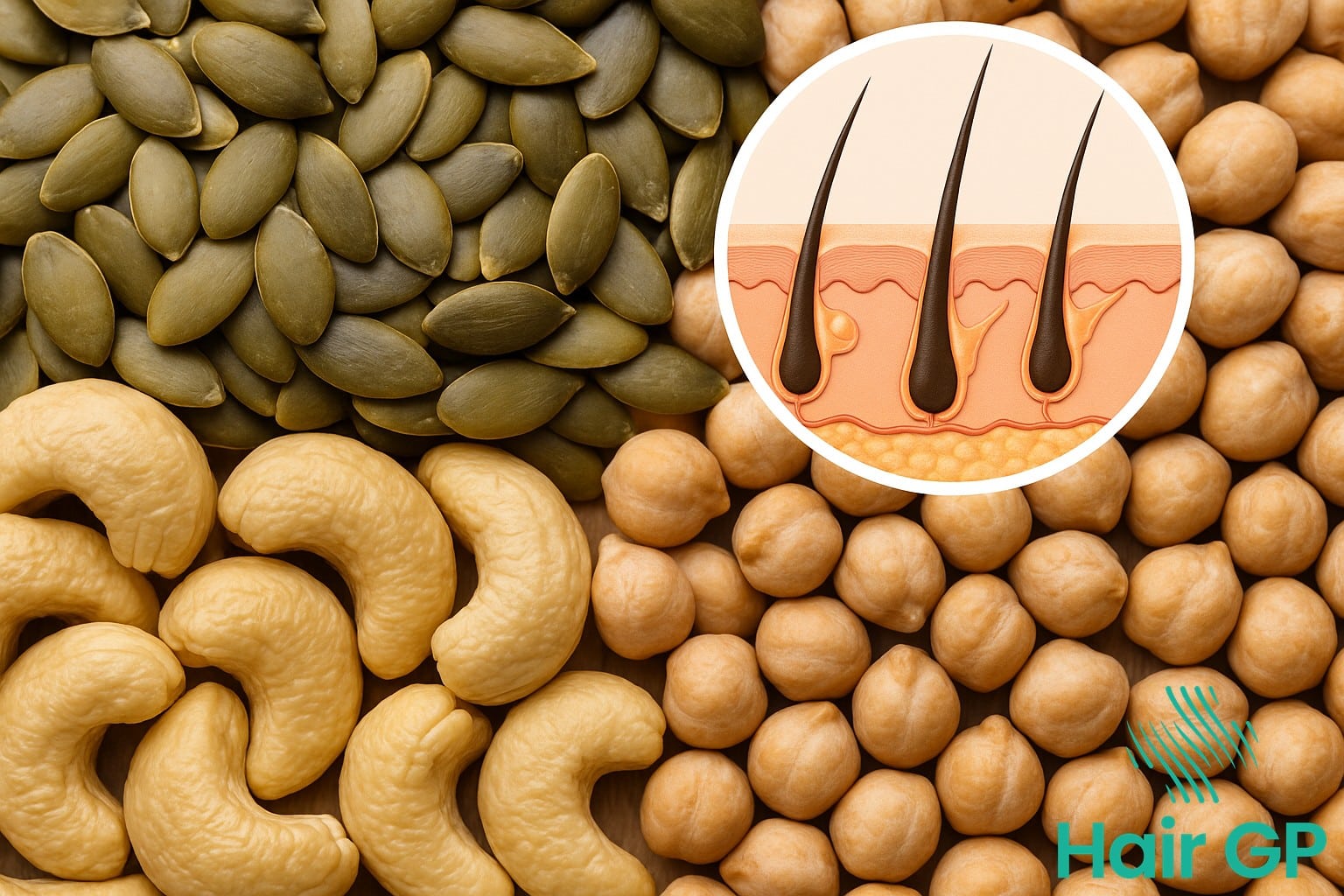
Essential Fatty Acids for Scalp Health
Essential fatty acids play a crucial role in maintaining optimal scalp health and promoting robust hair growth within plant-based dietary frameworks. These vital nutrients possess powerful anti-inflammatory properties that directly support scalp circulation and follicle function, making adequate intake essential for preventing hair-related issues in vegan lifestyles.
Omega-3s from Plant Sources
Plant-based omega-3 fatty acids primarily come from alpha-linolenic acid (ALA) sources, which the body converts to EPA and DHA with varying efficiency rates of 5-15%. Chia seeds represent one of the most concentrated ALA sources, providing approximately 5 grams per ounce alongside beneficial fibre and protein. Ground flaxseeds offer similar benefits, delivering 2.4 grams of ALA per tablespoon whilst supporting hormone balance through lignans.
Hemp seeds contribute both omega-3 and omega-6 fatty acids in beneficial ratios, making them ideal for comprehensive scalp health support. Walnuts provide substantial ALA content alongside vitamin E, which protects fatty acids from oxidation and enhances absorption.
For optimal conversion efficiency, algae-based EPA and DHA supplements bypass the conversion process entirely, delivering pre-formed omega-3s directly. These marine-derived supplements provide 300-600mg daily doses comparable to traditional sources whilst maintaining plant-based integrity. Maximising absorption requires consuming omega-3 sources with fat-soluble vitamins, particularly when taken alongside meals containing healthy fats.
Balancing Omega-6 to Omega-3 Ratios
Modern Western diets typically contain omega-6 to omega-3 ratios of 15:1 or higher, significantly exceeding the optimal 4:1 ratio recommended for reducing inflammatory responses affecting scalp health. Excessive omega-6 intake promotes pro-inflammatory pathways that can restrict blood flow to hair follicles and compromise nutrient delivery.
Common omega-6 sources requiring moderation include vegetable oils (sunflower, safflower, corn), processed foods, and nuts like brazil nuts and pine nuts. Whilst these foods provide nutritional value, overconsumption creates inflammatory imbalances affecting scalp conditions.
Optimising ratios involves increasing omega-3 rich foods whilst moderating omega-6 intake through cooking oil selection. Extra virgin olive oil and avocado oil provide better ratios than conventional vegetable oils. Incorporating daily servings of ground flaxseeds, chia seeds, or hemp hearts alongside weekly walnut portions supports optimal balance. Anti-inflammatory benefits become apparent within 6-8 weeks of ratio optimisation, manifesting as improved scalp comfort and enhanced hair texture.
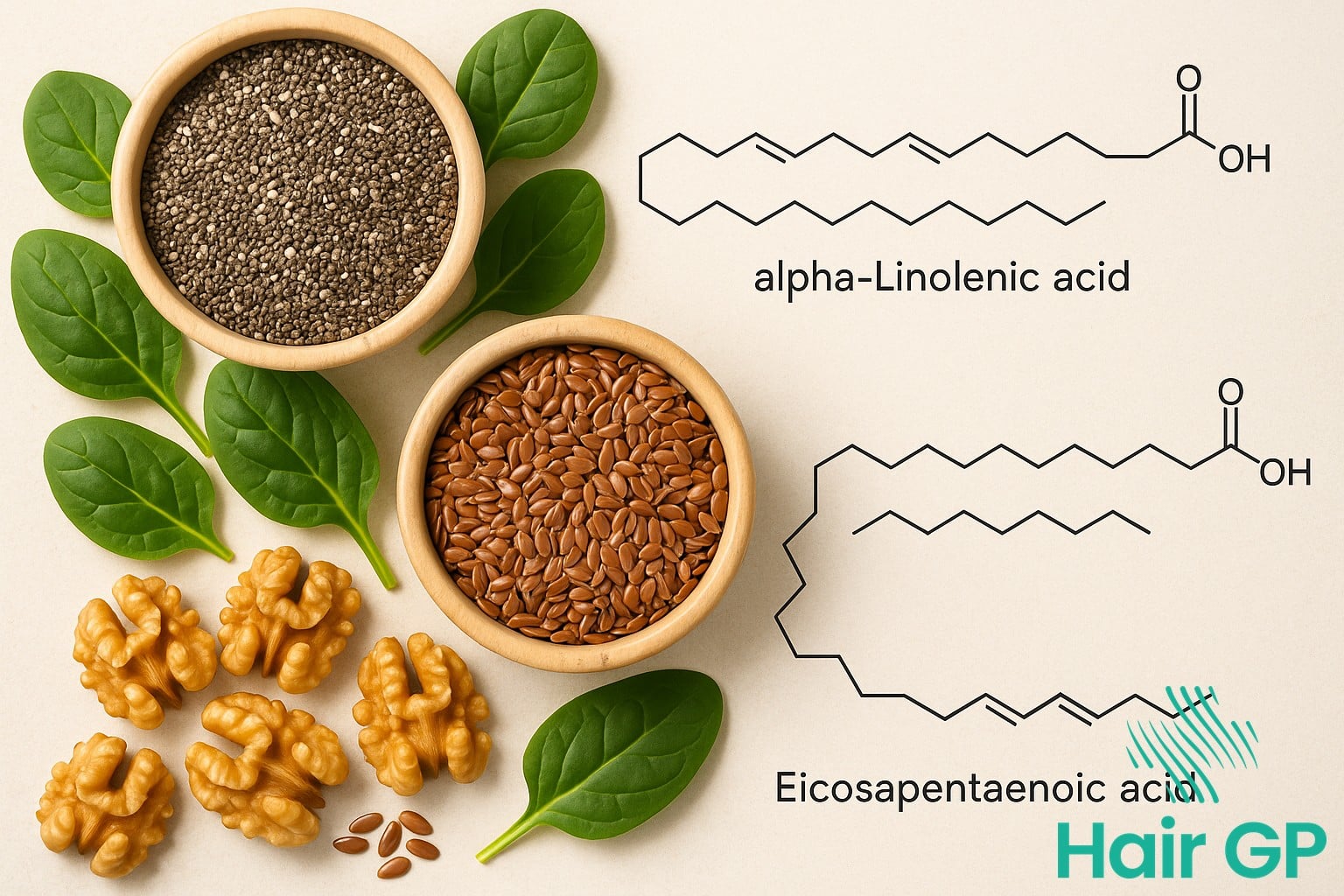
Vitamin D and Hair Follicle Health
The relationship between vitamin D and hair follicle health represents one of the most underappreciated aspects of nutritional dermatology, particularly affecting plant-based women who may already face challenges maintaining optimal vitamin levels. Research has established a compelling connection between vitamin D deficiency and various forms of hair loss, including alopecia areata and androgenetic alopecia [9]. This fat-soluble vitamin plays a crucial role in hair follicle cycling, influencing both the initiation of new hair growth and the maintenance of existing follicles.
Vitamin D receptors are abundantly expressed in hair follicle stem cells and dermal papilla cells, where they regulate the complex molecular pathways governing hair follicle development and regeneration [10]. When vitamin D levels are insufficient, these cellular processes become disrupted, leading to shortened anagen phases, prolonged telogen periods, and ultimately noticeable hair thinning or loss. The hair follicle relies on adequate vitamin D signalling to maintain its regenerative capacity and respond appropriately to growth factors.
Plant-based women face particular challenges in maintaining sufficient vitamin D levels, as few plant foods naturally contain meaningful amounts of this essential nutrient. Unlike omnivorous diets that may include fortified dairy products or other animal-derived sources, vegan diets typically provide minimal vitamin D through food alone. This limitation, combined with factors such as limited sun exposure, darker skin pigmentation, or geographical location, can create a perfect storm for low vitamin D status that may manifest as hair-related concerns.
Effective supplementation strategies become paramount for plant-based women experiencing hair issues potentially linked to vitamin D deficiency. Most experts recommend vitamin D3 (cholecalciferol) supplements, though plant-based alternatives using vitamin D2 (ergocalciferol) or lichen-derived D3 are available. Regular monitoring through 25-hydroxyvitamin D blood tests ensures optimal dosing, typically ranging from 800-1000IU daily depending on individual needs, baseline levels, and geographic factors affecting natural synthesis.
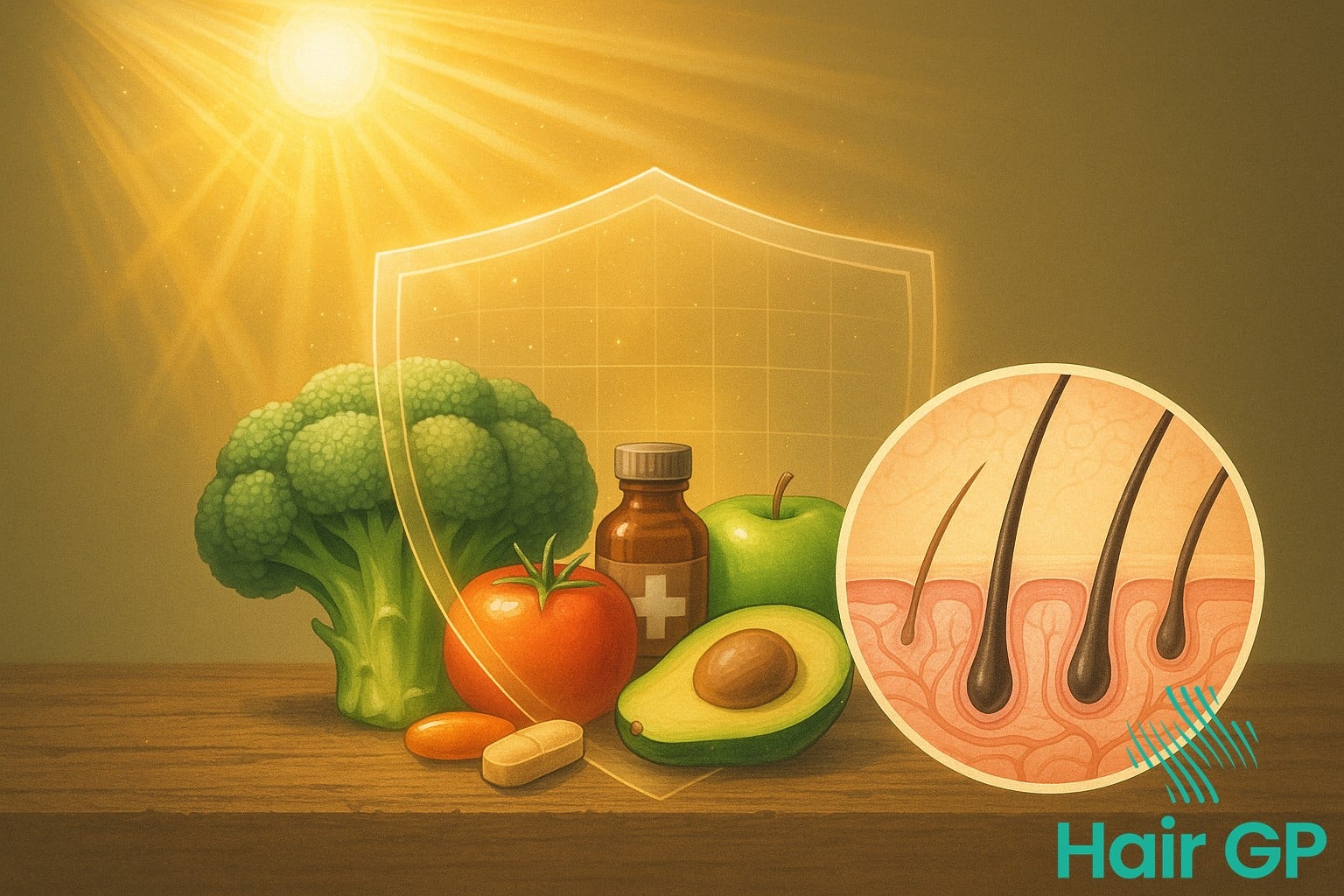
Plant-Based Superfoods for Hair Health
Achieving healthy hair through nutrition requires incorporating specific plant based foods that deliver concentrated amounts of essential vitamins, minerals, and healthy fats. These nutrient dense superfoods provide the building blocks your hair follicles need to produce strong, lustrous strands whilst supporting overall scalp health through their powerful combination of antioxidants, proteins, and trace minerals.
Seeds and Nuts for Hair Nutrition
Hemp hearts stand out as exceptional superfoods for healthy hair, delivering complete proteins containing all nine essential amino acids alongside gamma-linolenic acid, which helps regulate hormone production and reduce inflammation around hair follicles. These tiny powerhouses provide approximately 10 grams of protein per 3-tablespoon serving, making them perfect additions to smoothies or yoghurt bowls.
Pumpkin seeds offer remarkable zinc concentrations, with just one ounce providing nearly 20% of daily requirements. Zinc deficiency commonly manifests as hair thinning and delayed growth, making these seeds particularly valuable for maintaining hair density. Toast them lightly with sea salt for a satisfying snack or sprinkle over salads for added crunch.
Walnuts contribute essential omega-3 fatty acids through alpha-linolenic acid, supporting scalp circulation and adding natural shine to hair strands. Research indicates that omega-3s help maintain hair follicle health and may reduce excessive shedding. Incorporate a handful into breakfast cereals or blend into homemade energy balls for convenient daily consumption.
Leafy Greens and Colourful Vegetables
Spinach and kale provide exceptional folate and iron content, two nutrients crucial for healthy hair growth. Iron deficiency represents one of the most common nutritional causes of hair loss, particularly amongst women. These leafy greens also supply vitamin A, which helps produce sebum for natural scalp moisturisation. Steam lightly to preserve nutrient density or massage raw leaves with lemon juice for better iron absorption.
Bell peppers, especially red varieties, contain more vitamin C than citrus fruits, supporting collagen production essential for hair structure. Vitamin C also enhances iron absorption from plant based foods, creating synergistic benefits when combined with leafy greens in meals.
Sweet potatoes provide beta-carotene, which converts to vitamin A for supporting cell growth and preventing dry, brittle hair. Roast with minimal oil to maintain their nutrient profile whilst developing natural sweetness that pairs beautifully with other hair-supporting ingredients.
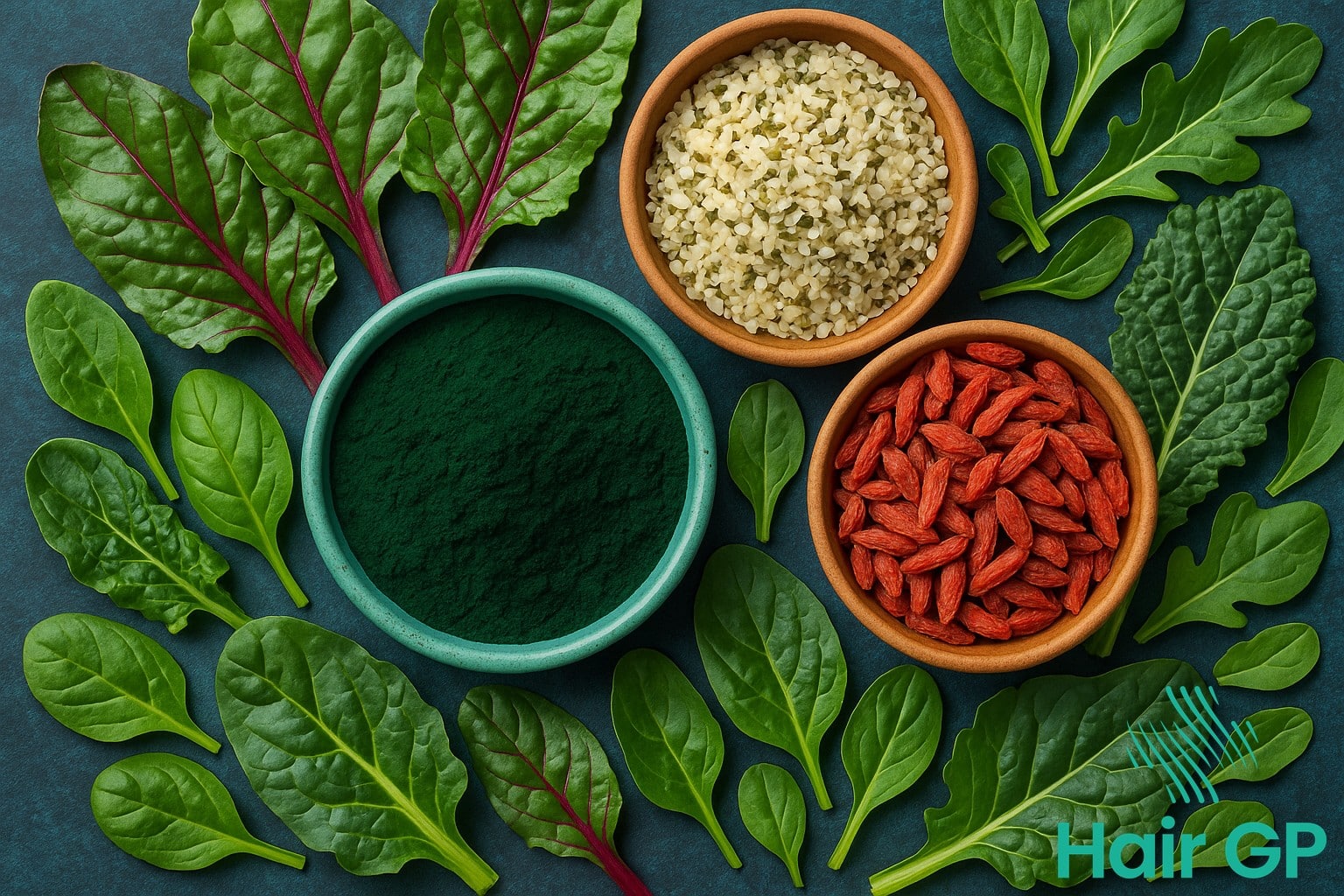
Strategic Supplementation for Plant-Based Women
Strategic supplementation represents a cornerstone approach for plant-based women seeking to prevent nutrient deficiencies that contribute to hair loss. Evidence-based protocols can effectively address common gaps in vegan diets whilst optimising hair follicle health through targeted nutritional interventions.
Essential vs Optional Supplements
Vitamin B12 stands as the only truly essential supplement for plant-based women, as this nutrient cannot be reliably obtained from plant sources and deficiency directly impacts hair growth cycles [2]. Unlike optional supplements, B12 supplementation is non-negotiable, requiring consistent daily doses of 250-500 micrograms or weekly doses of 2,500 micrograms to maintain adequate levels.
Iron supplementation requires individualised assessment through comprehensive testing before implementation. Ferritin levels below 40-70 ng/mL often correlate with hair thinning, yet unnecessary iron supplementation can cause oxidative stress and interfere with zinc absorption [11]. Plant-based women should prioritise serum ferritin, transferrin saturation, and complete blood count testing before considering iron supplements.
Biotin supplementation warrants careful consideration, as true biotin deficiency remains relatively rare in healthy individuals consuming varied plant-based diets. Biotin supplements showing efficacy typically target individuals with documented deficiencies rather than providing universal benefits [12]. However, biotin supplementation may benefit women experiencing temporary hair loss during dietary transitions or periods of metabolic stress.
Timing and Absorption Optimization
Supplement timing significantly influences absorption rates and therapeutic outcomes. B12 supplements achieve optimal absorption when taken on an empty stomach, preferably upon waking, as stomach acid facilitates intrinsic factor binding. Conversely, iron supplements require strategic timing—taking with vitamin C-rich foods enhances absorption whilst avoiding calcium, tea, or coffee within two hours prevents inhibition.
Interaction avoidance proves crucial for maintaining supplementation effectiveness. Zinc and iron compete for absorption pathways, necessitating separation by at least two hours. Similarly, calcium supplements can interfere with both iron and zinc uptake, requiring strategic spacing throughout the day.
Cycling strategies prevent tolerance development and optimise long-term outcomes. Iron supplementation benefits from intermittent protocols—taking supplements every other day often proves more effective than daily dosing for addressing nutrient deficiencies. This approach reduces gastrointestinal side effects whilst maintaining therapeutic benefits. Biotin supplements can be cycled monthly, with two weeks on followed by two weeks off, allowing assessment of underlying deficiency correction whilst avoiding unnecessary accumulation.
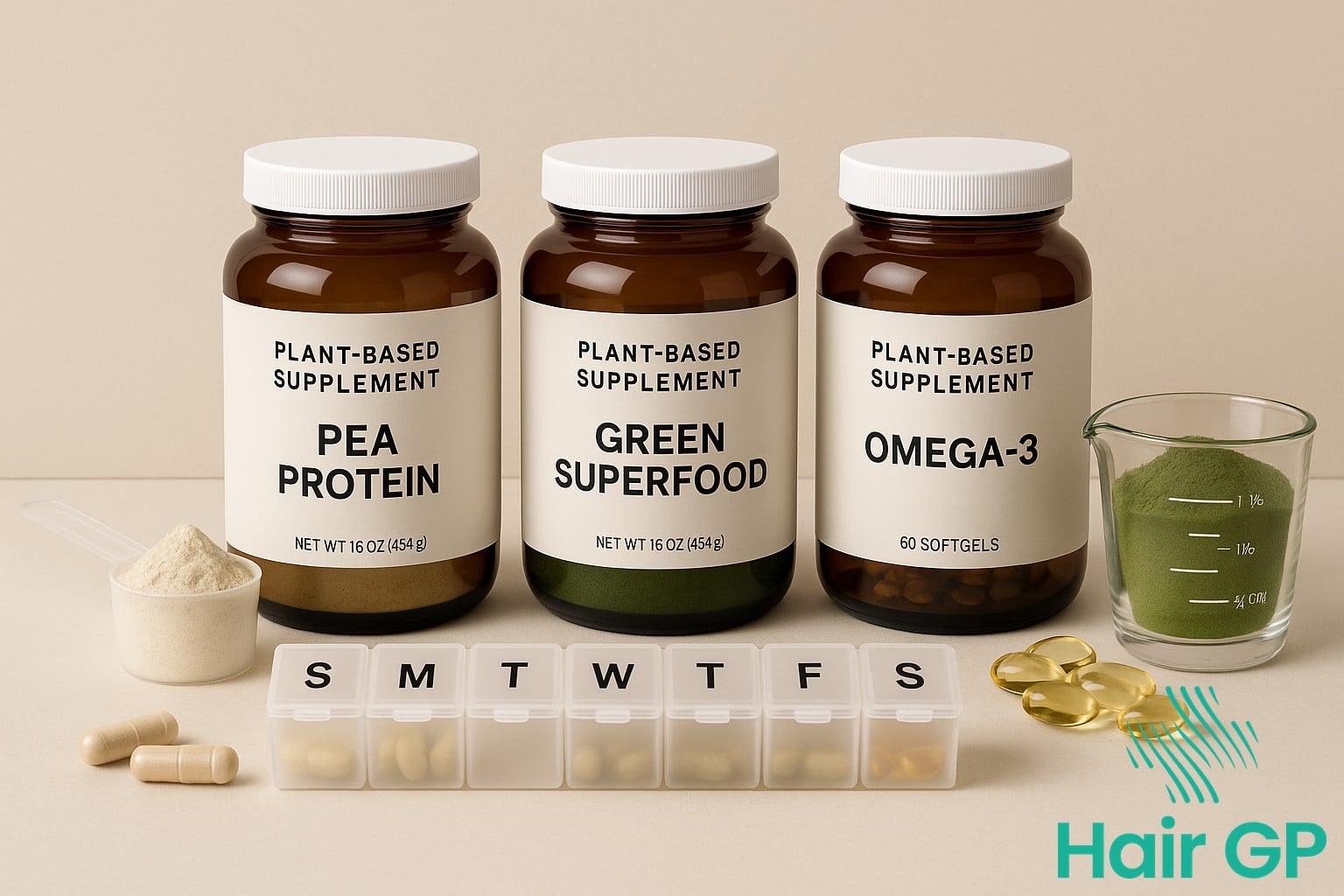
Creating Your Hair-Healthy Plant-Based Meal Plan
Developing an effective nutritional planning strategy for healthy hair growth requires thoughtful meal planning that balances essential nutrients throughout each day. A well-structured approach to plant based foods ensures consistent delivery of hair-supporting vitamins and minerals whilst maintaining dietary variety and satisfaction.
Daily Nutrient Distribution Strategies
Strategic timing of nutrients maximises absorption and supports continuous hair follicle nourishment. Morning meals should prioritise protein-rich plant based foods such as quinoa porridge topped with hemp seeds, or tofu scramble with nutritional yeast. These breakfast protein priorities establish amino acid availability for keratin synthesis throughout the day.
Lunch presents the optimal opportunity for iron optimisation, as vitamin C absorption peaks during midday hours. Combine iron-rich legumes like lentils or chickpeas with vitamin C sources such as bell peppers, tomatoes, or citrus fruits. A hearty chickpea and spinach curry with quinoa provides exceptional iron bioavailability whilst supporting healthy hair growth.
Evening nutritional planning should emphasise B vitamin focus, particularly B12 and folate requirements. Incorporate fortified plant milks, nutritional yeast, and leafy greens into dinner preparations. A warming bowl of fortified plant milk-based soup with kale and white beans delivers essential B vitamins whilst promoting relaxation before sleep.
Sample Weekly Meal Plans
Effective meal planning incorporates diverse breakfast combinations to prevent nutrient monotony. Rotate between chia seed puddings with berries and nuts, overnight oats with ground flaxseeds and almond butter, and smoothie bowls featuring protein powder, spinach, and tropical fruits. These variations ensure comprehensive amino acid profiles whilst maintaining breakfast appeal.
Lunch options should emphasise mineral-dense plant based foods through varied preparations. Monday might feature a Buddha bowl with quinoa, roasted vegetables, and tahini dressing, whilst Wednesday could include a hearty lentil soup with wholegrain bread. Friday’s lunch might showcase a chickpea salad sandwich with sprouted grain bread, ensuring consistent iron and zinc intake.
Dinner variety supports long-term adherence to hair-healthy eating patterns. Alternate between protein-rich combinations such as black bean and sweet potato tacos, tempeh stir-fry with brown rice, and hearty vegetable curry with coconut milk. Include weekly servings of fortified plant milks, nutritional yeast-based sauces, and algae-derived omega-3 supplements to address potential nutritional gaps.
This structured approach to nutritional planning transforms healthy hair growth from a dietary challenge into an enjoyable culinary journey, ensuring optimal nutrient delivery through thoughtfully planned plant based foods.
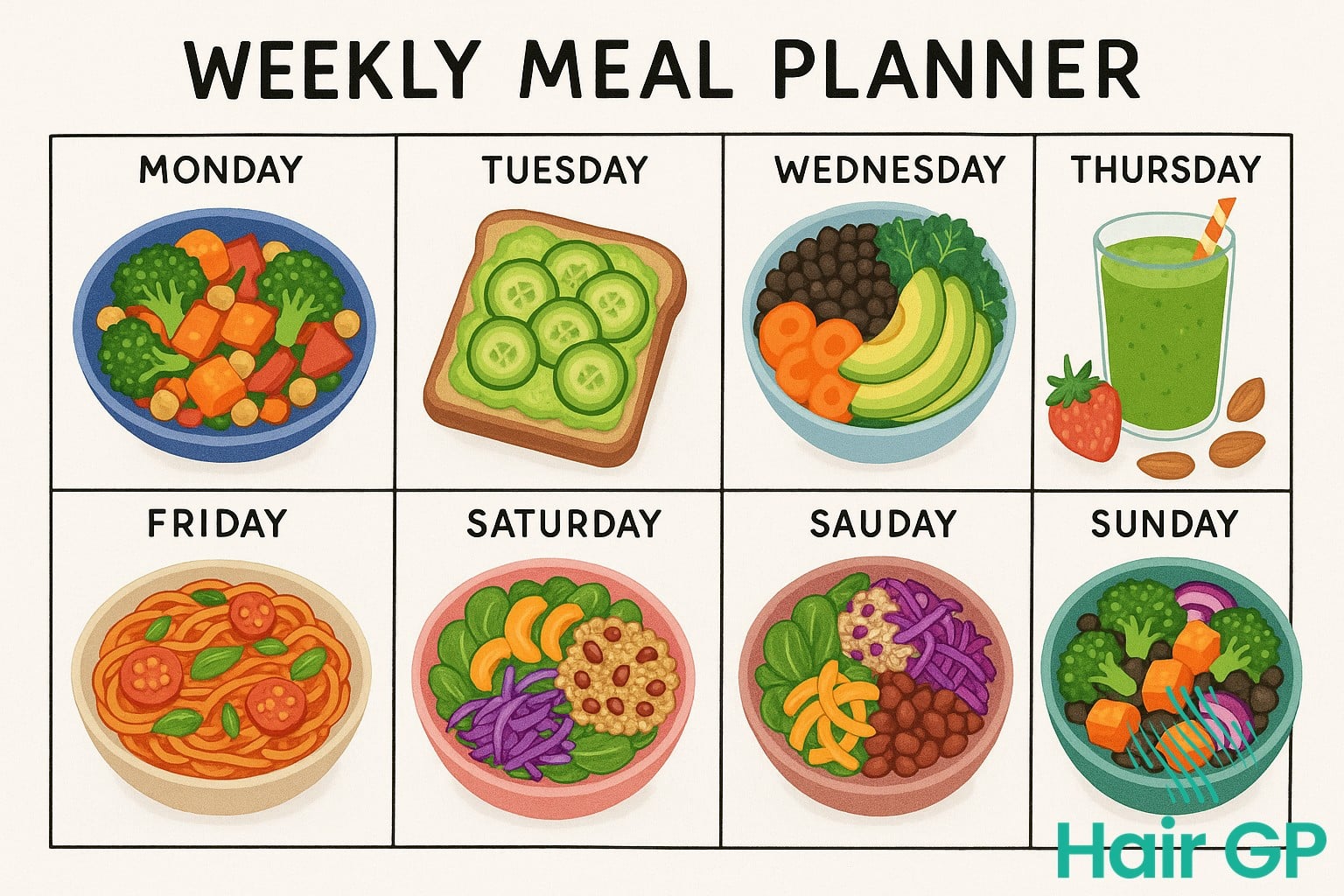
Monitoring Progress and Adjusting Your Approach
Effective progress monitoring forms the foundation of successful hair health improvement, allowing you to track meaningful changes and make informed adjustments to your nutritional approach. Begin documenting your hair’s condition through weekly photographs taken in consistent lighting, focusing on areas of concern such as thinning spots or overall density. Additionally, maintain a simple hair journal recording daily hair fall during washing and brushing, noting any changes in texture, strength, or growth patterns over time.
Recognising genuine hair improvement requires patience, as healthy hair growth cycles typically span 3-6 months before noticeable changes emerge. Early positive indicators include reduced hair breakage during styling, improved scalp comfort, and decreased daily hair loss in your brush or shower drain. As your nutritional interventions take effect, you may observe increased shine, enhanced manageability, and stronger hair strands that resist snapping under gentle tension. New growth often appears finer initially but gradually thickens as follicles strengthen.
Regular assessment of your dietary approach enables timely adjustments that optimise results. If progress stagnates after 8-12 weeks, consider increasing your intake of specific nutrients showing deficiency in your initial assessment, or introduce complementary foods that enhance absorption. For instance, combining iron-rich foods with vitamin C sources can significantly improve iron uptake, whilst ensuring adequate protein distribution throughout the day supports consistent amino acid availability for hair synthesis.
Professional consultation becomes necessary when hair loss accelerates despite consistent nutritional improvements, or when scalp conditions such as persistent itching, inflammation, or unusual patches develop. Additionally, seek expert guidance if you experience other symptoms alongside hair changes, including fatigue, weight fluctuations, or hormonal irregularities, as these may indicate underlying health conditions requiring comprehensive evaluation. A qualified healthcare provider can perform appropriate testing and recommend targeted interventions beyond dietary modifications.
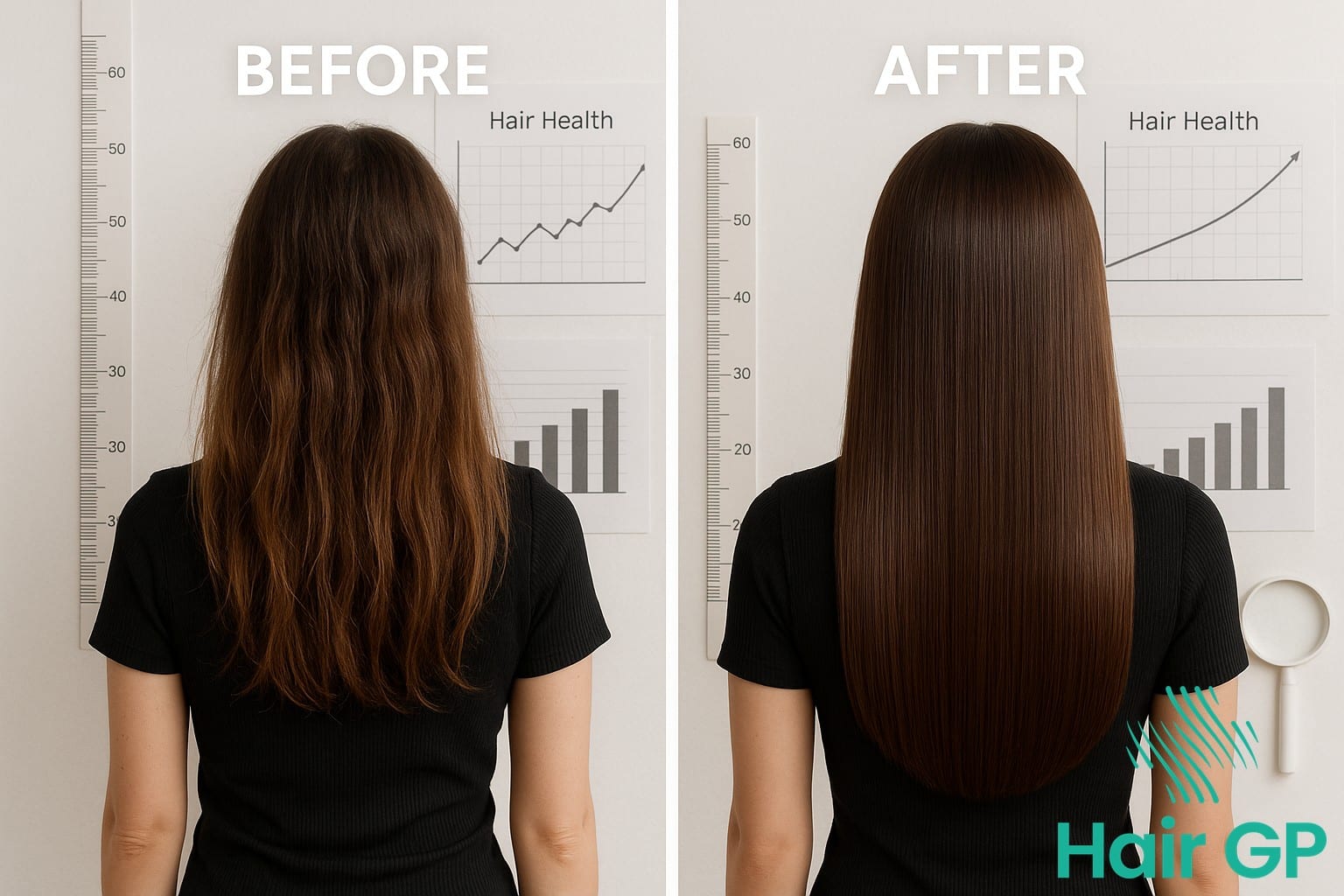
Conclusion
Plant-based women can absolutely achieve and maintain excellent hair health through strategic nutritional planning and mindful supplementation. The evidence clearly demonstrates that healthy hair growth thrives when essential nutrients are adequately supplied through well-designed plant-based eating patterns.
Success hinges on prioritising protein diversity through legumes, quinoa, and hemp seeds, whilst ensuring optimal iron absorption through vitamin C pairing and avoiding inhibitory compounds during iron-rich meals. B-vitamin supplementation, particularly B12 , alongside adequate zinc and omega-3 fatty acids, forms the nutritional foundation for robust hair follicle function.
Regular monitoring through comprehensive blood panels enables early detection of deficiencies before hair health deteriorates. Working with qualified healthcare practitioners ensures personalised supplementation protocols that address individual biochemical needs rather than generic recommendations.
The journey to optimal hair health requires patience, consistency, and evidence-based approaches. Plant-based women who implement these targeted strategies typically observe improvements within 3-6 months, reflecting the natural hair growth cycle. Take proactive steps today by assessing your current nutritional status, optimising your plant-based meal planning, and establishing appropriate supplementation protocols. Your hair health journey begins with informed action and sustained commitment to nutritional excellence.
Frequently Asked Questions
A well-planned plant-based diet should not cause hair loss. However, nutrient deficiencies common in poorly planned vegan diets, such as iron, B12, protein, or zinc deficiencies, can contribute to hair thinning and loss.
Hair growth cycles typically take 3-6 months to show visible improvements. Once nutrient deficiencies are corrected, new hair growth should become apparent within this timeframe, though individual results may vary.
The most critical supplements for plant-based women are vitamin B12, iron (if deficient), vitamin D, and potentially algae-based omega-3s. Biotin supplementation may help if deficient, but it’s often unnecessary with a balanced diet.
Yes, plant-based proteins can absolutely support healthy hair growth when consumed in adequate amounts and variety. Combining different protein sources ensures all essential amino acids needed for keratin production are available.
Nutrient-related hair loss often presents as diffuse thinning or increased shedding, while hormonal hair loss typically follows a pattern. Blood tests can reveal nutrient deficiencies, and consulting a healthcare provider helps determine the underlying cause.
References
- Ramos PM, Miot HA. Female Pattern Hair Loss: a clinical and pathophysiological review. An Bras Dermatol. 2015. PMID: 26375223
- Guo EL, Katta R. Diet and hair loss: effects of nutrient deficiency and supplement use. Dermatol Pract Concept. 2017. PMID: 28243487
- Almohanna HM, Ahmed AA, Tsatalis JP, Tosti A. The Role of Vitamins and Minerals in Hair Loss: A Review. Dermatol Ther (Heidelb). 2019. PMID: 30547302
- Craig WJ. Nutrition concerns and health effects of vegetarian diets. Nutr Clin Pract. 2010. PMID: 21139125
- Hallberg L, Brune M, Rossander L. The role of vitamin C in iron absorption. Int J Vitam Nutr Res Suppl. 1989. PMID: 2507689
- Sebastiani G, Herranz Barbero A, Borrás-Novell C, Alsina Casanova M, Aldecoa-Bilbao V, Andreu-Fernández V et al.. The Effects of Vegetarian and Vegan Diet during Pregnancy on the Health of Mothers and Offspring. Nutrients. 2019. PMID: 30845641
- Gibson RS, Raboy V, King JC. Implications of phytate in plant-based foods for iron and zinc bioavailability, setting dietary requirements, and formulating programs and policies. Nutr Rev. 2018. PMID: 30010865
- Lönnerdal B. Dietary factors influencing zinc absorption. J Nutr. 2000. PMID: 10801947
- Banihashemi M, Nahidi Y, Meibodi NT, Jarahi L, Dolatkhah M. Serum Vitamin D3 Level in Patients with Female Pattern Hair Loss. Int J Trichology. 2016. PMID: 27625563
- Amor KT, Rashid RM, Mirmirani P. Does D matter? The role of vitamin D in hair disorders and hair follicle cycling. Dermatol Online J. 2010. PMID: 20178699
- Trost LB, Bergfeld WF, Calogeras E. The diagnosis and treatment of iron deficiency and its potential relationship to hair loss. J Am Acad Dermatol. 2006. PMID: 16635664
- Patel DP, Swink SM, Castelo-Soccio L. A Review of the Use of Biotin for Hair Loss. Skin Appendage Disord. 2017;3(3):166-169. PMID: 28879195

